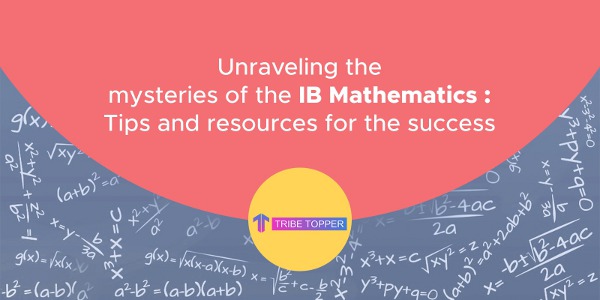IB Mathematics is a rigorous and comprehensive course designed to develop students’ mathematical understanding, problem-solving skills, and critical thinking abilities. The course is offered at Mathematics HL (Higher Level) and Mathematics SL (Standard Level).

The HL course covers many topics, including algebra, functions, calculus, statistics, and probability, emphasizing abstract reasoning and mathematical exploration. Students are expected to solve complex problems, analyze data, and apply mathematical concepts in real-life situations. The HL course requires a deeper understanding of mathematical principles and is suited for students pursuing mathematics, engineering, or other math-intensive fields.
The SL course provides a solid foundation in mathematics, covering topics such as algebra, functions, geometry, and statistics. It emphasizes the practical application of mathematical concepts and is suitable for students who require a basic understanding of mathematics for their chosen fields of study.
Both levels involve internal assessment components, where students undertake mathematical investigations and present their findings. Additionally, there is an external examination at the end of the course, assessing students’ knowledge and problem-solving abilities.
IB Mathematics aims to develop students’ mathematical thinking, logical reasoning, and problem-solving skills, preparing them for further studies in mathematics or related disciplines. The course encourages students to appreciate the beauty and utility of mathematics while fostering an understanding of its applications in various fields.
Mathematics can be challenging for many students, but with the right approach and resources, success in IB Mathematics is achievable. The International Baccalaureate (IB) Mathematics curriculum is designed to develop students’ mathematical knowledge, understanding, and skills, and it covers a wide range of topics, including algebra, geometry, calculus, and statistics. This guide will explore some tips and resources that can help you excel in IB Mathematics.
1. Understand the Curriculum: It’s crucial to understand the curriculum before diving into any subject. Familiarize yourself with the syllabus, learning outcomes, and assessment criteria of IB Mathematics. This will give you a roadmap of what you need to learn and the expectations for each topic.
2. Master the Basics: Mathematics is built upon foundational concepts. Ensure you have a solid understanding of fundamental concepts such as algebraic manipulation, equations, and functions. Strengthen your knowledge of basic arithmetic, fractions, and percentages, as they form the basis for more advanced topics.
3. Practice Regularly: Mathematics requires regular practice to enhance problem-solving skills and build fluency. Solve various problems from textbooks, past papers, and online resources. Practice improves your accuracy and speed and helps you identify areas where you need more practice.
4. Ask for an explanation: Don’t be afraid to get assistance or an explanation when in doubt. IB Mathematics can be complex, and clarifying any doubts early on is essential. Approach your teacher, classmates, or online forums for guidance. Exploring different perspectives can deepen your understanding of challenging topics.
5. Collaborate with Peers: Engage in group study sessions or form study groups with your classmates. Collaborative learning can help you reinforce concepts, discuss challenging problems, and exchange different approaches to problem-solving. Explaining topics to others is an excellent approach to solidifying your comprehension.
6. Review and Revise Regularly: IB Mathematics is a cumulative subject. Regularly review and revise previously learned topics to maintain a strong foundation. Allocate time for revision in your study schedule, and use revision guides, flashcards, and summary notes to reinforce your knowledge.
7. Practice IB Maths online sample papers: Familiarize yourself with the examination format and practice IB Mathematics Online Sample Papers. This will help you become accustomed to the types of questions asked and the time constraints. Analyze your performance, pinpoint your strengths and weaknesses, and strengthen those areas.
8. Seek Exam Strategies: Besides content knowledge, understanding exam strategies is crucial for success. Learn to manage your time effectively during exams, read questions carefully, and identify key information. To increase your speed and accuracy, practice operating under time constraints.
9. Seek Additional Help if Needed: If you’re struggling with a particular topic or concept, consider seeking additional help from tutors or online resources. Sometimes, a different teaching approach or perspective can significantly affect your understanding.
10. Stay Organized: Create a study plan or schedule that allows you to cover all the necessary topics and allocate sufficient time for practice and revision. Stay organized with your notes, textbooks, and resources to access them when needed easily. A structured approach will help you stay on track and reduce last-minute stress.
11. Develop Problem-Solving Skills: Mathematics is not just about memorizing formulas; it’s about developing problem-solving skills. Practice critical thinking, logical reasoning, and analysis. Resources play an important role in success. That’s why we recommend Utilizing Interactive Learning Resources. The internet provides a wealth of interactive resources to support your learning.
Tribe Topper is the best website that can provide you with sample papers and much more resources to help you prepare. Other websites may include Khan Academy, Mathisfun, and IXL, which offer comprehensive explanations, video tutorials, and practice problems. Use these resources to reinforce your understanding of concepts and gain exposure to problem-solving techniques.
